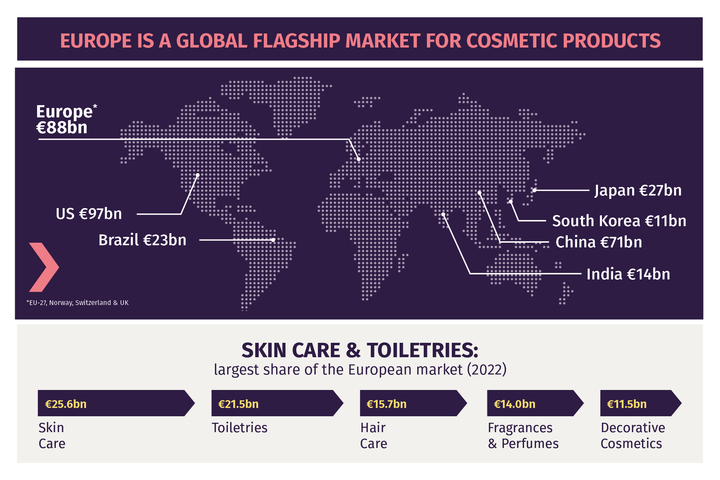From antiperspirants, fragrances, make-up and shampoos, to soaps, sunscreens and toothpastes, our products are ever-present in the lives of Europeans of all ages and of both sexes. The market penetration of some cosmetic products, like deodorants, toothpaste and shampoos, is near 100%.
The functional benefits of cosmetic products are clear. They bring significant contributions to wellbeing and health, from soap being used to wash hands in order to prevent the spread of disease, to toothpaste helping to reduce the prevalence of dental caries and gum disease.
Beyond functional benefits, we are constantly learning about the emotional benefits of our products. Cosmetics can help to improve our mood, enhance our appearance and engender positive self-esteem. They can also help to exhibit personal style and, as such, are an important means of social expression. A recent European Consumer Perception study by Cosmetics Europe has shown that 71% of people believe that cosmetics improve their quality of life, while 70% of people believe cosmetics help them to build up their self-esteem.
A study by the Renfrew Center Foundation (2012) found that almost half of women feel less confident when they do not wear make-up. Moreover, they can help to exhibit personal style and, as such, are an important means of social expression. 60% of people state that cosmetics have a positive impact on wellbeing, image and mood (FEBEA, 2014).
Many cosmetic companies support Look Good Feel Better (LGFB), a charity dedicated to improving the self-esteem, confidence and well-being of women and teenagers undergoing cancer treatment. The charity is supported by over 50 leading companies and brands from the cosmetics industry. LGFB helps to improve self-image and appearance through free group and self-help skincare and make-up workshops. The service is available in 26 countries worldwide and over 1.87 million people have been supported to date. By learning how best to care for their skin and use cosmetic products, attendees say they feel better about themselves, regaining a sense of normality and confidence to go about their daily lives. A major research project by LGFB highlighted that 97% of respondents felt more confident after attending a LGFB workshop and that the effects of this are enduring, with 96% of respondents still feeling more confident three months later (out of 2,000 beneficiaries contacted).
Our industry is also major employer. More than 254,259 people are employed directly in the manufacture of cosmetic products, while at least 2,778,674 people are employed indirectly (downstream) in the European cosmetics value chain.
Advertising is an important part of the interaction we have with consumers, and companies have a responsibility to provide clear information so people can make informed choices. To this end, our industry charter and guiding principles on responsible advertising and marketing communication provides guidance to ensure that advertising is legal, decent, honest and truthful, including advice on specific areas like airbrushing, taste and decency, advertising to children, and respect for the human being.


